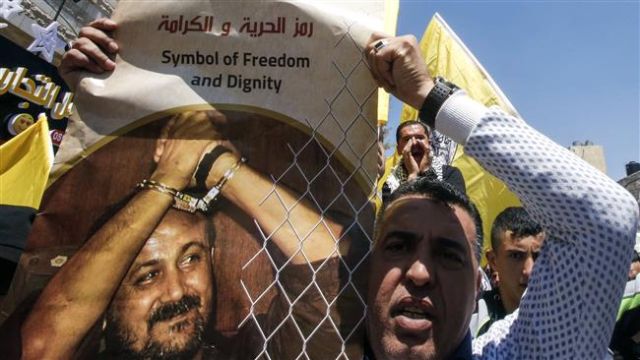
Dozens of Palestinians were injured by Israeli forces in the occupied West Bank on May 5 during mass protests in solidarity with the 1600 Palestinians in Israeli prisons, Ma’an news agency said that day. Protesters were hit by live rounds and rubber bullets as they showed their support for the prisoners, who were then on the 19th day of a mass hunger strike against their treatment.
In an example of the stakes, ex-Palestinian prisoner Mazen Muhammad al-Mughrabi, a 45-year-old resident of Ramallah, died on May 1 from medical complications he sustained during his time in Israeli custody, Palestinian Committee of Prisoners' Affairs head Issa Qaraqe told Ma’an.
Initial local news reports suggested he died while on hunger strike in solidarity with the prisoners, which has since been denied — although his death is clearly related to conditions the prisoners are protesting against.
Processions were held for Mughrabi in Ramallah, where support for the prisoners remains strong and defiant.
The demands of the hunger strikers are for basic civil rights. There are 6500 Palestinian prisoners held by Israel, including 300 children. About 500 are being held under “administrative detention” — meaning they are held without trial by court orders that can be renewed indefinitely.
Since 1967, Israel has jailed about 800,000 Palestinians — about 40% of the male population.
Despite the scale of the hunger strike and huge popular support enjoyed by the prisoners and their campaign for “freedom and dignity”, Israel shows no signs of acceding to any of the prisoners’ demands to end their ill-treatment.
Prisoners have released a series of demands to improve their conditions. An April 26 Washington Post op-ed by Julie M Norman explained: “The primary demand [of the hunger strike] is to ensure regular family visits ... Other demands include pay phones to make family calls, improved medical services and an end to administrative detention.”
The International Committee of the Red Cross (ICRC) released a May 3 statement pointing out that, under international humanitarian law, Israel is obligated to allow family visits.
“According to the Fourth Geneva Convention of 1949, Palestinians are entitled to these visits, which can only be limited for security reasons, on a case by case basis, but never for strictly punitive or disciplinary purposes,” the statement said.
It also noted that, under international law and the Fourth Geneva Convention, an occupying power is forbidden to hold prisoners from an occupied territory outside of the occupied land. Yet the vast majority of Palestinian prisoners from the occupied West Bank and Gaza are held in prisons inside Israel. This makes it even more difficult for relatives and loved ones to arrange visits, especially with the huge number of checkpoints Palestinians are required to cross.
In the face of Israeli intransigence, prisoners’ health continues to deteriorate. Instead, prison authorities seem to be escalating the daily humiliations designed to break prisoners and quash attempts to organise within the prisons.
Electronic Intifada reported on May 2 that Israeli authorities were severely impeding communication from the strikers to the outside world. They have transferred protest leaders into solitary confinement and blocked visits by families and lawyers.
The article said: “On April 20, the Israel Prison Service reportedly ordered mobile phone companies to block reception in the western area of the Naqab desert in the south of the country to prevent Palestinians on strike in the Ketziot and Nafha prisons from communicating.
“The blackout was partially lifted after Israeli residents in the area complained of service disruptions.”
The grimness of the prisoners’ welfare and the routine human rights violations are at the core of the prisoner rights campaign.
Barring hunger striking prisoners from receiving legal assistance and visits from lawyers has the double effect of hindering communication with the outside world and reporting accurately on the prisoners’ condition. It also seeks to make it all but impossible for prisoners to mount a legal defence against the charges on which they are held — assuming they even know on what basis they are being held, which many held under administrative detention do not.
As protests continue in the West Bank and Gaza Strip in support of the prisoners, international actions are growing grow.
In Britain, university students in Edinburgh and Manchester have begun solidarity hunger strikes. They join the 60 students at the Bir Zeit University in the West Bank who have also gone on hunger strike.
With the hunger strike entering a dangerous phase with deaths possible, Palestinian Authority (PA) P0resident Mahmoud Abbas visited the US to meet with US President Donald Trump — a strong supporter of Israel. There was no indication the hunger strikers were discussed — or any detail on plans to resolve the broader conflict or occupation.
Abbas may be worried about the eruption of grassroots protests in support of prisoners outside the control of the PA. There is growing disillusionment among Palestinians about the PA’s capacity to advance their interests in any way in the face of Israeli attacks and intransigence.
While Abbas returns from Washington with little to show, Palestinian resistance across the occupied territory continues — with support for the defiant prisoners becoming a major catalyst.
Like the article? Subscribe to Green Left now! You can also like us on Facebook and follow us on Twitter.